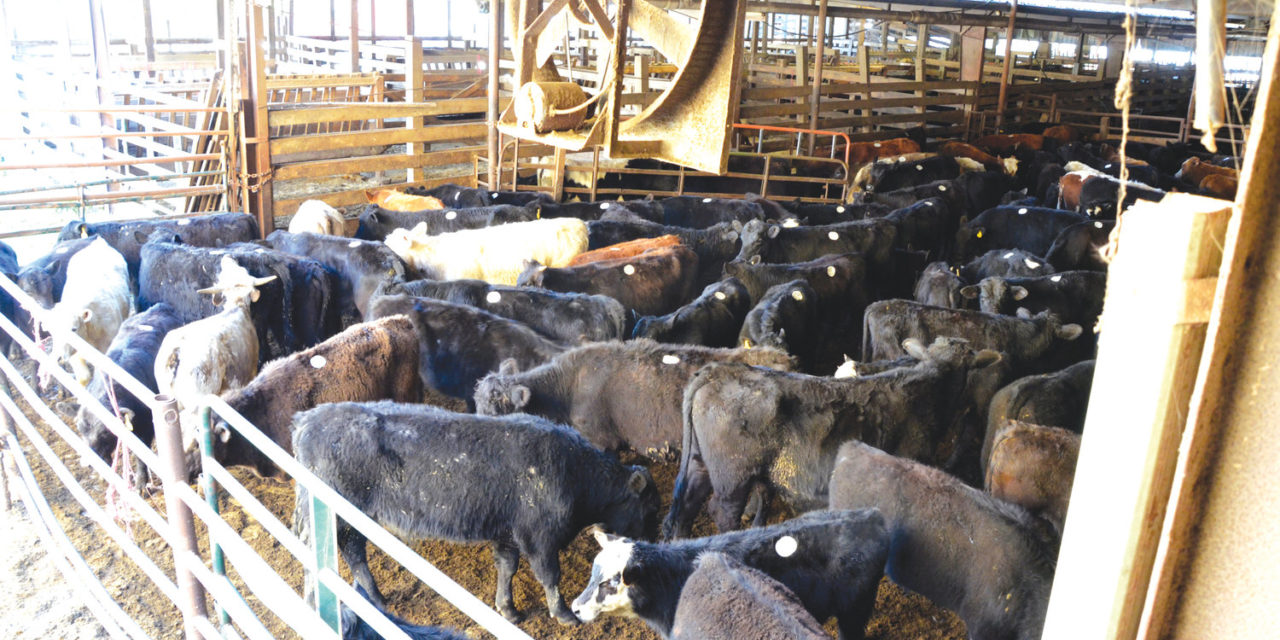![]()
By Zachary Horner, Chatham News + Record Staff
Each Monday and Friday, farmers and cattle ranchers gather at the Carolina Stockyards to sell their livestock.
If you arrive a couple hours before the auctions begin, you’ll hear a lot of noise. But the predominant sound is the cacophony of mooing as transports of cows arrive on the scene.
It’s a sound that, if you drive around the whole of Chatham County, isn’t that out of place.
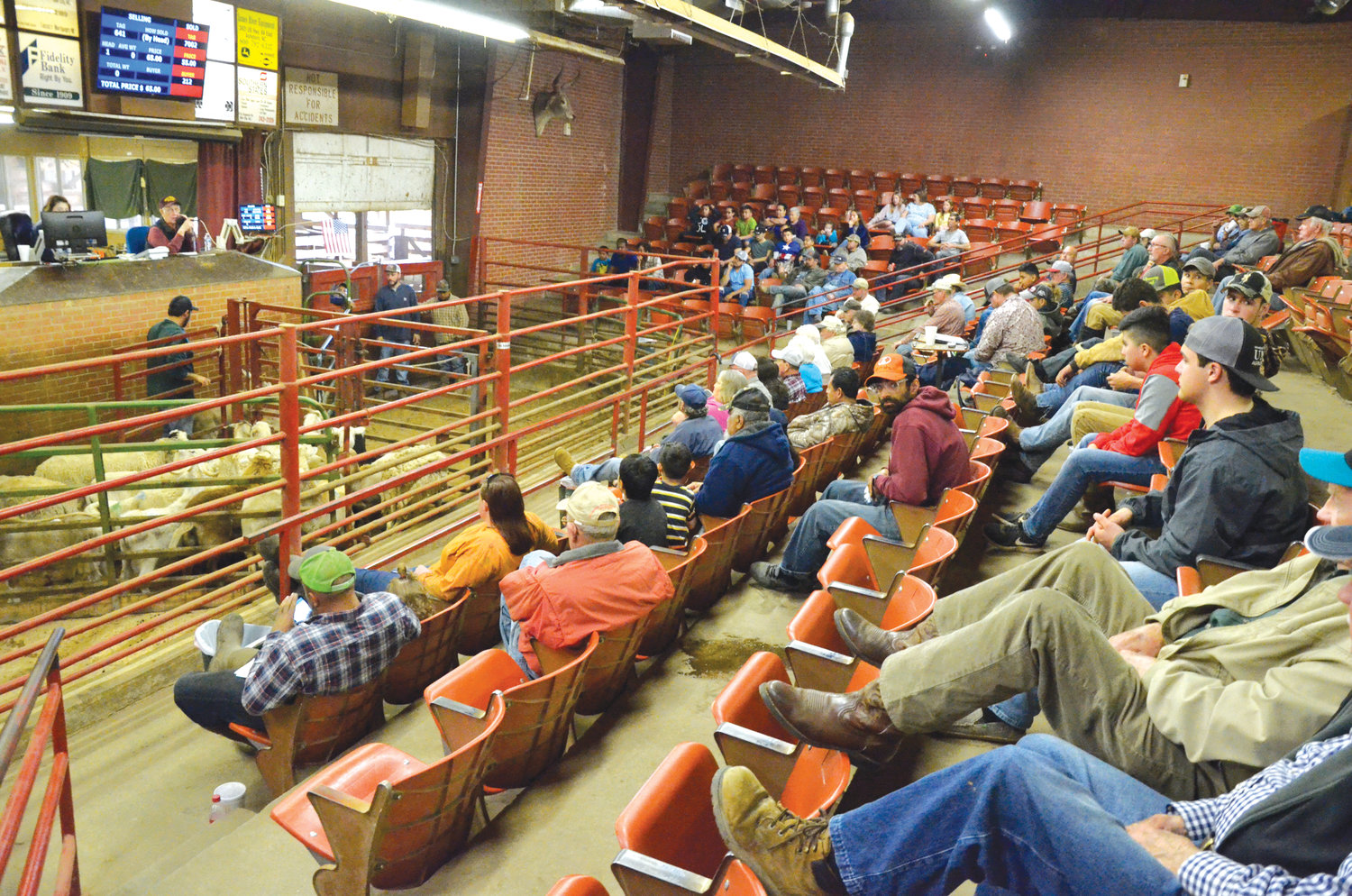
A good crowd is on hand Friday to watch and bid on the livestock going through the pens at the Carolina Stockyard. A tote board above auctioneer Kenneth Green and clerk Meghan Teague keeps track of the animals being sold, and their price. (Photo via David Bradley)
According to the 2017 Census of Agriculture, compiled by the U.S. Department of Agriculture, Chatham County produced the second-highest number of beef cows in the state — with nearly 15,000 — by county and the fourth-most cattle in all (37,500 in total). Those who follow the industry say it’s a combination of the county’s geography and ecology and the placement of a popular market, all contributing to an overall financial impact in Chatham of almost $120 million.
Ashley Robbins is the Extension agent specializing in livestock at the Chatham County Center of the N.C. Cooperative Extension. She’s got a masters degree in animal science and studied cattle reproductive physiology. Simply, she says, “this is just a very good area to grow cows.”
Primarily, Robbins cites the area’s natural ability to grow fescue, “which is a very hardy forage that produces a lot of tonnage as far as volume for cows to graze on.” To the east, the ground is too sandy, and to the west, it’s too rocky and too cold. Chatham County, it turns out, is in the sweet spot for what is essentially self-reproducing food for cows.
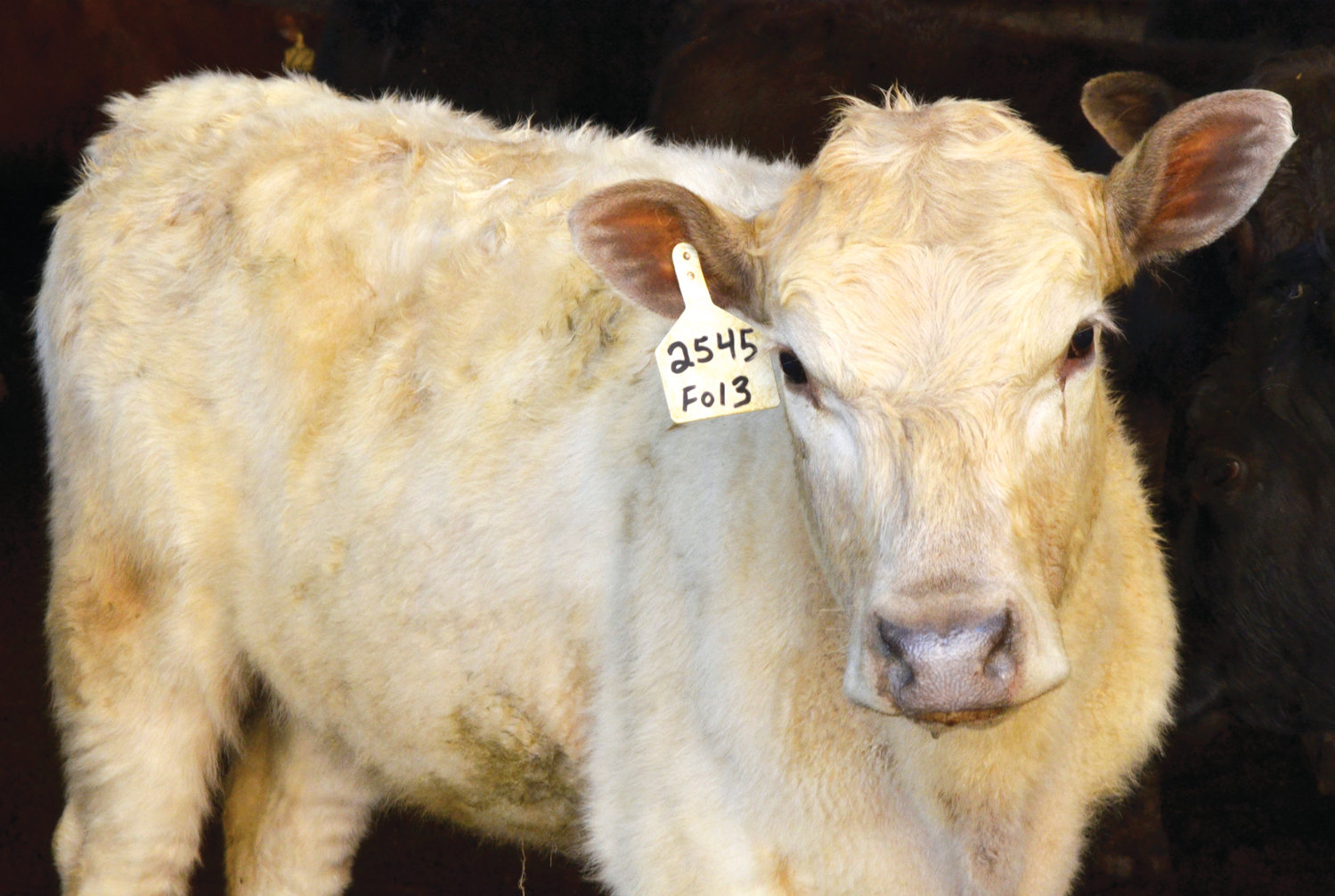
One of the many cows being sold at the stockyards auction, this one has an ear tag to give it a specific identity for sale. (Photo via David Bradley)
“We have this red clay here in the county which is able to grow this grass,” Robbins said. “It’s very tough and it just comes back every year.”
Additionally, Chatham has a lot of available farmland — about 111,800 acres in total, with 36 percent used for pastures — and its proximity to areas like Chapel Hill, Raleigh and Asheboro allow farmers to grow cattle for niche markets.
“Whether they’re going to be grass-fed or natural or local, (farmers are) going to be able to sell to those areas pretty easily,” she said.
Finally, there’s the Carolina Stockyards. In existence in Siler City since 1948, the sale barn’s auctions bring sellers from across the state and buyers from across the country.
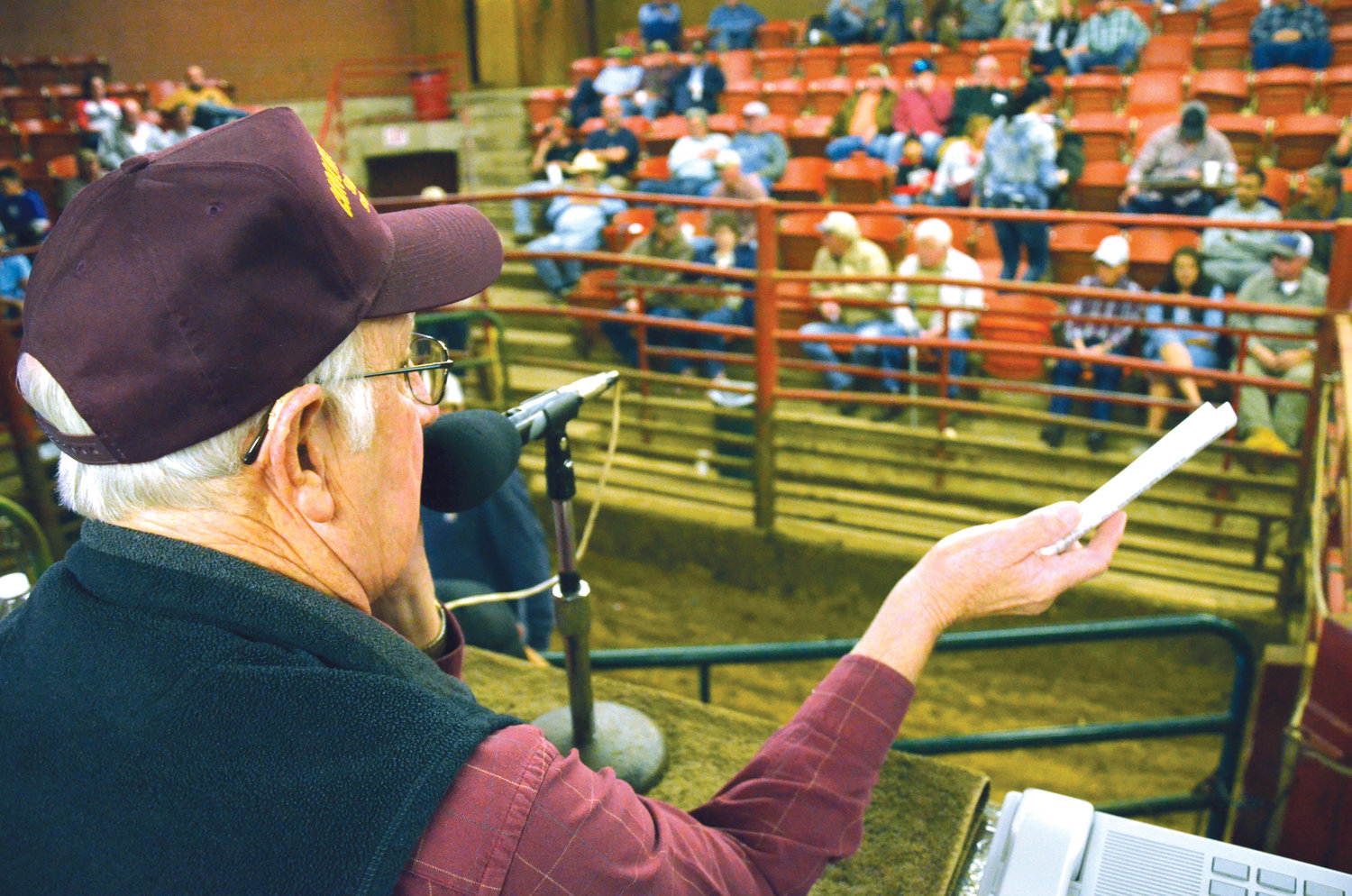
Kenneth Greene, auctioneer at the Carolina Stockyards, has been doing this for 30 years. “I just grew up in it,” he said. (Photo via David Bradley)
Robert Crabb, who owns the barn, adds that the prevalence of chicken litter, which helps grow grass, improves the cattle market. He sees the benefits of that every week. From the March 25 and 29 markets, the Carolina Stockyards saw nearly 2,000 head of cattle sold, which is a pretty high number, from 337 sellers. It’s those numbers which keep his barn in business.
“You’ve got to have numbers,” Crabb said. “You’ve got to have enough cattle to draw the buyers. And then you’ve got to have enough buyers to draw the cattle. It’s always a challenge to keep both going.”
Crabb said the cattle sold in Siler City “stay anywhere from fairly local to New Mexico.” Most of it, though, will go to places like Kansas, Texas, Oklahoma and Nebraska.
The southeastern part of the country, he added, is good for younger cows, getting them started, but not for getting them ripe for slaughter.
“It’s not a real good climate nor is it profitable to truck corn this way to feed them to finish them,” he said. “It’s better to truck the cattle to the corn. So that’s why so many cattle leave the whole southeast to go to Kansas, Nebraska, Oklahoma and Texas to be fed. Very few cattle are finished in North Carolina.”
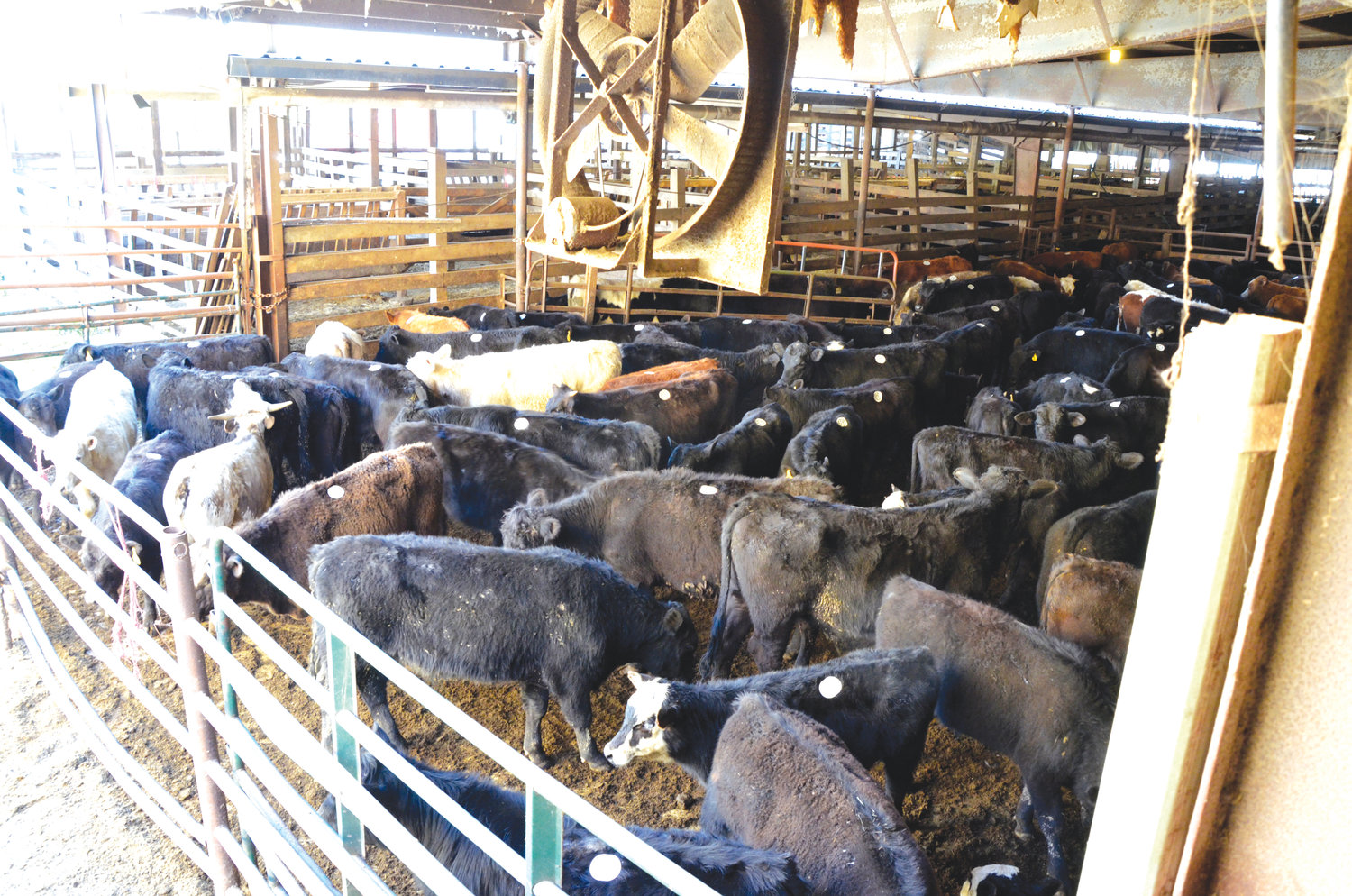
A small herd of cattle wait to go on the auction block Friday at the Carolina Stockyards. More than 1,300 head were sold there that particular day. (Photo via David Bradley)
The N.C. Department of Agriculture lists just nine stockyards on its cattle and goat reports website. There used to be much more, Crabb said, but the market has consolidated to just a few places, like Turnersburg, Canton, Mt. Airy, Shelby and Siler City.
“Back in those days, they weren’t near as big,” he said. “In the ’70s, they sold 400-500 head of cattle here a week, whereas now we sell 1,400-1,500.”
Friday’s sale brought in 1,373 head of cattle, an increase from the previous week’s count of 1,093 and the 887 sold at the same time last year, according to a report from the USDA. It’s that quantity of product available, Robbins said, that makes the Stockyards a popular place. Companies can fill a whole tractor-trailer with one load because of the number.
Additionally, it allows for families to put food on the table and continue a long tradition, something Robbins said is just like the demand for beef or milk.
“It’s encouraging to know that there’s a lot of tradition behind farming, just knowing that you’re providing a good quality product for people to consume,” she said. “That’s very rewarding and that’s why farmers really do it. They’re putting food on the table for their family and for the rest of the country and the world, wherever their meat’s going.”
And as long as there is a dinner table, Robbins said, Chatham residents will be hearing the bellow of cattle across the county.
“Knowing it’s a commodity that people will always want and need, it’s encouraging,” Robbins said. “People are always going to want to eat beef or drink milk.”

Chapelboro.com has partnered with the Chatham News + Record in order to bring more Chatham-focused stories to our audience.
The Chatham News + Record is Chatham County’s source for local news and journalism. The Chatham News, established in 1924, and the Chatham Record, founded in 1878, have come together to better serve the Chatham community as the Chatham News + Record. Covering news, business, sports and more, the News + Record is working to strengthen community ties through compelling coverage of life in Chatham County.

